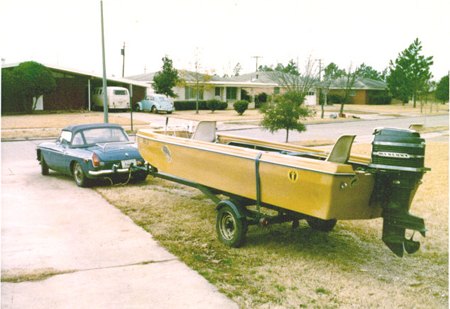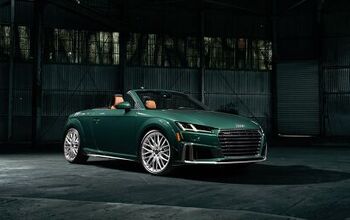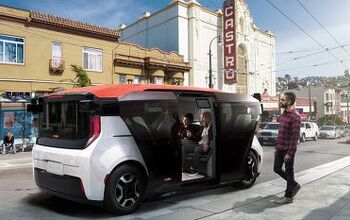President Bush's State of The Union Address: Towing the Line?
In last night’s State of the Union address, President Bush cooked-up a cute little saying: “20 by 10.” That’s a 20% reduction in American gas consumption over the next 10 years. In case you thought the Prez has decided to whack automakers with a 2 X 4, the fine print centers on renewable and alternative fuels: corn ethanol (E85), biodiesel, hydrogen and dilithium crystals. Bush also promised to change car fuel economy regs from current fleet averages to attribute-based (size) requirements. There’s a link to the plan below, and plenty of analysis online. So let’s talk about towing.
Before the State of the Union speech, the SUV Owners of America (SUVOA) sent out a press release blaring “99% of Car Towing Capacity Lost Since 1970s.” My first reaction: naw, c’mon, really? Other than bell bottoms, my 800 meter sprint time and the original Windows operating system, I can’t think of anything that’s declined so precipitously in the last thirty years. And yet it’s true: 70% of American cars could tow 2100 pounds then, just 1% now.
My second thought: who cares? It’s not as if a car’s ability to tow a bass boat is vital to our national security. Besides, today’s tow oriented buyers can buy any number of SUV’s (or decacab pickups) with enough towing capacity to haul most of Montana, and pay chump change for the privilege. Hell, they’re giving them away! Ah, the SUVOA asks, but for how long?
The SUVOA warns that federal regs threaten to emasculate America’s SUV’s towing capacity, just as they did for the automobile.
"Federal auto policy doesn't always consider the tradeoffs that exist among national goals,” claimed SUVOA President Barry W. McCahill. “One day the focus is on new safety requirements. The next, it's on tougher emissions controls. Today, it's on both those and improving fuel economy and they are often at odds with each other… The loss of car towing capacity and reductions in safety because of vehicle downsizing are unfortunate historical evidence of what can happen."
Call Mr. McCahill a reactionary Luddite whose Ostrich-like head posture is warming the planet to oblivion, but he has supporters. The SUVOA press release summons Derrick Crandall, President and CEO of the American Recreation Coalition.
"The only vehicles left that enable people to enjoy the great outdoors- SUVs and pickups- are under attack and could also lose towing capacity. Nobody intended to kill off the station wagon that was the mainstay for family transportation and recreation. But it happened."
Well, the minivan happened. But Crandall’s point is clear: Uncle Sam’s politically correct pursuit of high mileage vehicles ignores the bigger picture.
The U.S. is home to more than 11 million trailer boats and five million trailer RVs– and that doesn’t include trailers for motorcycles, ATV’s, snowmobiles, U-Hauled goods, farm equipment, etc. Mess with that and you’re messing with Americans’ ability to enjoy the great outdoors, move stuff around, grow crops and, um, fight obesity (Crandall’s idea).
While none of this is bound to impress people fully committed to an immediate and dramatic improvement in America’s vehicular efficiency– many of whom will claim it’s entirely possible to reconcile environmental goals with the recreational industry’s “needs”– it’s certainly true that lawmakers working in this area are unlikely to consider the unintended consequences of their legislative actions.
The UK offers us a glimpse of what can happen when government’s heavy hands wrap around the neck of the automotive free market in the name of environmentalism. Our British cousins now tax cars based on their CO2 emissions and location (“congestion charging” and coming soon “road pricing”). Despite being an oil-producing nation, they also sport some of the world’s highest gas prices (three times US prices). Oh, and everything car related is taxed at 17.5% (VAT or “Value Added Tax”). The result: the vast majority of Britain’s so-called working class can’t afford a car.
This lack of car ownership restricts their citizen’s mobility, which restricts economic migration, which exacerbates the country’s vast North – South, urban – rural economic divide. Even if lower income UK consumers CAN buy a car, the vehicle sucks-up a large percentage of their income, which prevents them from spending it on other things (obviously). In other words, the government’s anti-car policies– which depend on the same oil addiction and anti-pollution rhetoric we know and love– depress UK inhabitants’ living standards.
Could it happen here? The State of the Union speech doesn’t provide much indication where the U.S. federal government will draw the line. Depending on your point-of-view, the fact that the proposed automotive efficiency standards offer a new set of loopholes (e.g. automakers can now buy and sell CAFE credits) is either a blessing or a conspiracy in disguise. Meanwhile, the free market is speaking, as consumers decide how much mileage they need. The question is, is their government listening?
RF interviews the SUVOA's Ron Defore below.
[Click here for the president's proposals.]
More by Robert Farago
Latest Car Reviews
Read moreLatest Product Reviews
Read moreRecent Comments
- Kwik_Shift_Pro4X Poop or get off the pot.
- TheMrFreeze The wife unit and I refuse to buy a white/black/grey/silver car...life's too short for boring. As it happens we both drive orange cars right now but slightly different shades. Total coincidence, just happened that the used cars we found that met our requirements (ie: manual trans and at least some amount of character) both happened to be orange. My previous daily driver was orange as well, again total coincidence...they just seem to find us I guess...
- Marcus36 In other words...."WE have no idea what we are doing"
- Donald This is what happens when you make your wife CFO. This is all the result of accounting problems. And could’ve been avoided with a reserve of liquidy.
- Rochester When I was young, a number of girls I dated wanted to own a Jeep. I didn't understand (and don't like them myself), but it was certainly something. So good for Jeep leaning into that.


































Comments
Join the conversation
What a vigorous debate! It's been almost 30 years since Al Gore and Amory Louvins got me started in this energy/environment puzzle. Then, it was a far-out, fringey subject. Now, it's a topic of everyday conversation. Why, even Bush has come not quite all the way back to his campaign stance of 2000, when he promised to regulate carbon emissions! I'm a speed reader, but I haven't had time to read more than half this discussion. Breifly, because I respect your time, here's three points I didn't see covered. 1) McCahill, that's a familiar name. Look at some way-back issues of the "Mechanix"-style mags of the '50s and '60s and you'll see "Uncle" Tom McCahill as the leading byline reviewing Detroit iron, plus a few new British and German sports cars. Is this SUV spokesman of the same name his son, or his grandson? 2) Nuke power may be spotless on the CO2 charts, but it's a mistaken path. It's always more expensive than demand-side conservation measures (how about outlawing the black roofing shingle, in favor of lighter colors? Down goes summertime peak electrical consumption in the Southwest.) But consider the worst aspect of nuclear power-- the fuel cycle. Every pound of spent nuclear fuel is a curse on future generations who will have to store it or dispose of it somehow, while keeping all of it out of the air the water, not to mention WMDs. In a hundred years or a thousand, that waste remains lethal, but the electricity it generated is gone with the wind. For that reason, I'd prefer coal-generated power, because it makes us pay most of the pollution price in our own time. 3) The solutions to the trailer towing problem are easier and more immediate than the answers to the global climate change predicament. When I want comfy camping, I roll out my Scamp fiberglass trailer and hitch it up. It sleeps and feeds four in it's 16-foot interior. With few options (no bathroom), it weighs and even ton. My Forester finds that a comfortable load, never straining, bogging down or overheating as it cruises the open road at 18 mpg. It runs about the same whether I'm on the Eastern Colorado plains or the Western Colorado Rockies: 60 mph is easy, 70 is harder, and any sort of hill requires a downshift. The trailer has brakes, and it's egg shape is unaffected by sidewinds. Anyone can afford a 20-year-old model like mine, which cost $2,500. For any bigger trailer, I'd need more car. Any smaller trailer wasn't worth the trouble of towing it, IMO. So I feel I've found the perfect compromise, whether or not it would qualify for Mr. McCahill's list.
Luther: You are right in more ways than one. I don't mean to quote Metallica, but it's Sad but True